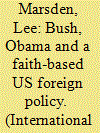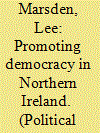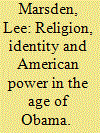| Srl | Item |
| 1 |
ID:
115276


|
|
|
|
|
| Publication |
2012.
|
| Summary/Abstract |
In a calculated move to appeal to his core constituency during his first term, President George W. Bush launched domestic and international faith-based initiatives designed to leverage public finance for religious groupings to carry out social and welfare functions formerly performed by government or secular organizations. In December 2002 the Center for Faith-Based and Community Initiatives (CFBCI) was extended to the United States Agency for International Development (USAID). The Center's intention was to 'create a level playing field' for faith-based and community groups to compete for foreign assistance funding. These presidential initiatives are problematic, however, calling into question the first amendment-the separation of church and state. Upon taking office Barack Obama set up the Office of Faith-based and Neighborhood Partnerships, promising a greater emphasis on community/neighbourhood programs. The CFBCI remains a fixture in USAID and Obama shows as much enthusiasm for the initiative as his predecessor. Faith-based international relations and political science scholars have sought to build on these initiatives and call for a greater role for faith in US foreign policy. On the eve of the 2012 presidential election, this article considers the claims for a faith-based foreign policy by examining the construction of a faith-based discourse by academics and successive presidents. Using faith-based initiatives and USAID as a case-study, the article discusses criticisms of the policy and focuses on the role of a conservative evangelical organization, Samaritan's Purse, to illustrate the advantages and disadvantages of faith-based approaches. The article argues that advocates of faith-based foreign policy, in seeking special privileges for ecumenical religious actors, overlook their declining international significance and the opportunities afforded to less tolerant but more populist religious actors which have the potential seriously to harm US foreign policy objectives.
|
|
|
|
|
|
|
|
|
|
|
|
|
|
|
|
| 2 |
ID:
070821


|
|
|
| 3 |
ID:
105365


|
|
|
|
|
| Publication |
2011.
|
| Summary/Abstract |
US foreign policy owes much to a malleable religious identity, shaped by foundational myths, and that this religious dimension has, until recently, been largely neglected in the US foreign policy literature to the detriment of our understanding of how America's status as global hegemon is formed, sustained and expanded. This article explores the role of the foundational myths of manifest destiny, exceptionalism and innocent nation. These foundational myths are explored as they develop into a civil religion espoused by successive presidents from George Washington to the present day. The article considers how Barack Obama has utilised civil religion to maximise domestic support for a foreign policy agenda, which seeks to maintain US hegemony through a more conciliatory and multilateral approach than his predecessor in the White House. Examples of the use of soft power through missionary endeavour and the evangelicalisation of military hard power beginning during the George W. Bush presidency are detailed in order to reveal an Obama presidency that continues to define itself in religious terms while providing opportunities for religious actors to continue to play a role in representing US interests beyond its shores.
|
|
|
|
|
|
|
|
|
|
|
|
|
|
|
|